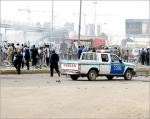 almotamar.net Forbes
almotamar.net Forbes - A suicide bomber struck Sunday outside a college campus in Baghdad, killing at least 16 people and injuring dozens as a string of other blasts and rocket attacks left bloodshed around the city.
Most of the victims outside the College of Business Administration and Economics were students, police said.
Earlier, two rockets slammed into a Shiite enclave in southern Baghdad, killing at least 10 people.
The attacks came following an exchange of artillery and mortar fire between U.S. troops and suspected Sunni insurgents south of the capital - where a major security operation launched earlier this month has tried to cripple militant factions and sectarian killings.
The Katyusha rockets hit Abu Dishir, a Shiite area surrounded by a prominently Sunni neighborhood, during the busy morning shopping hours.
Outside the College of Business Administration and Economics in eastern Baghdad, a suicide attacker detonated a bomb-rigged belt, killing 16 people and injuring dozens, police said.
The college is located in a mostly Shiite district, but does not limit its enrollment to that group. It's part of Mustansiriyah University, which is located in another area of the city, and was the target of twin car bombs and a suicide blast last month that killed 70 people.
Earlier, a bomb blast killed at least two people near the edge of the fortified Green Zone, which houses the U.S. and British embassies and key Iraqi government offices. The blast was about 100 yards from the Iranian Embassy, but authorities did not believe it was targeting the compound.
A separate car bombing in a Shiite district in central Baghdad killed at least one person and injured four, police said.
In the northern city of Mosul, U.S. troops killed two gunmen in a raid and captured a suspected local leader of the insurgent group al-Qaida in Iraq, the military said. Additional details were no immediately available.
Iraq's Interior Ministry, meanwhile, raised the toll from a suicide truck bombing in the violence-wracked Anbar province on Saturday to 40 dead and 65 injured.
The attack on worshippers leaving a mosque in Habbaniyah, about 50 miles west of Baghdad, was believed linked to escalating internal Sunni battles between insurgents and those who oppose them.
U.S. military envoys and pro-government leaders have worked hard to sway clan chiefs and other influential Anbar figures to turn against the militants, who include foreign jihadists fighting under the banner of al-Qaida in Iraq. The extremists have fought back with targeted killings and bombings against fellow Sunnis.
The imam of the mosque attacked Saturday had spoken out against extremists - most recently in this Friday's sermon, residents said. Many people in the neighborhood work for the Iraqi military and police forces, who frequently come under militant attack.
"There is no safe shelter for all outlaws," said Prime Minister Nouri al-Maliki, who reported that 426 militants have been captured since the Baghdad security campaign began Feb. 14.
But the crackdown also has sent Sunni insurgents fleeing the city to the nearby province of Diyala, which has emerged as a new and busy front for U.S. troops.
It has become so volatile that the Pentagon may delay plans to turn over control of Diyala to the Iraqi military by the end of the year, Maj. Gen. Benjamin Mixon told The Associated Press.
"The potential is there" to hand over Iraq's other 17 provinces "except in Diyala, where the future remains in question," said Mixon, commander of U.S. forces in northern Iraq, which includes Diyala.
Diyala, northwest of Baghdad, is known as "Little Iraq" because of its near-equal mix of Sunni and Shiite Arabs as well as Kurds - the country's three major groups. Al-Qaida in Iraq leader Abu Musab al-Zarqawi, a Jordanian, was killed in a U.S. airstrike in Diyala last year. Sunni extremists claim Diyala's capital, Baqouba, as the seat of an Islamic state in Iraq.
Direct fire attacks on U.S. soldiers are up 70 percent in Diyala since last summer, and fierce battles have raged since the Baghdad security plan was launched.
"We're working our way into the Baghdad security plan, and we won't be into the thick of it until late spring or summer. I expect more violence in Diyala through then," Mixon said.

